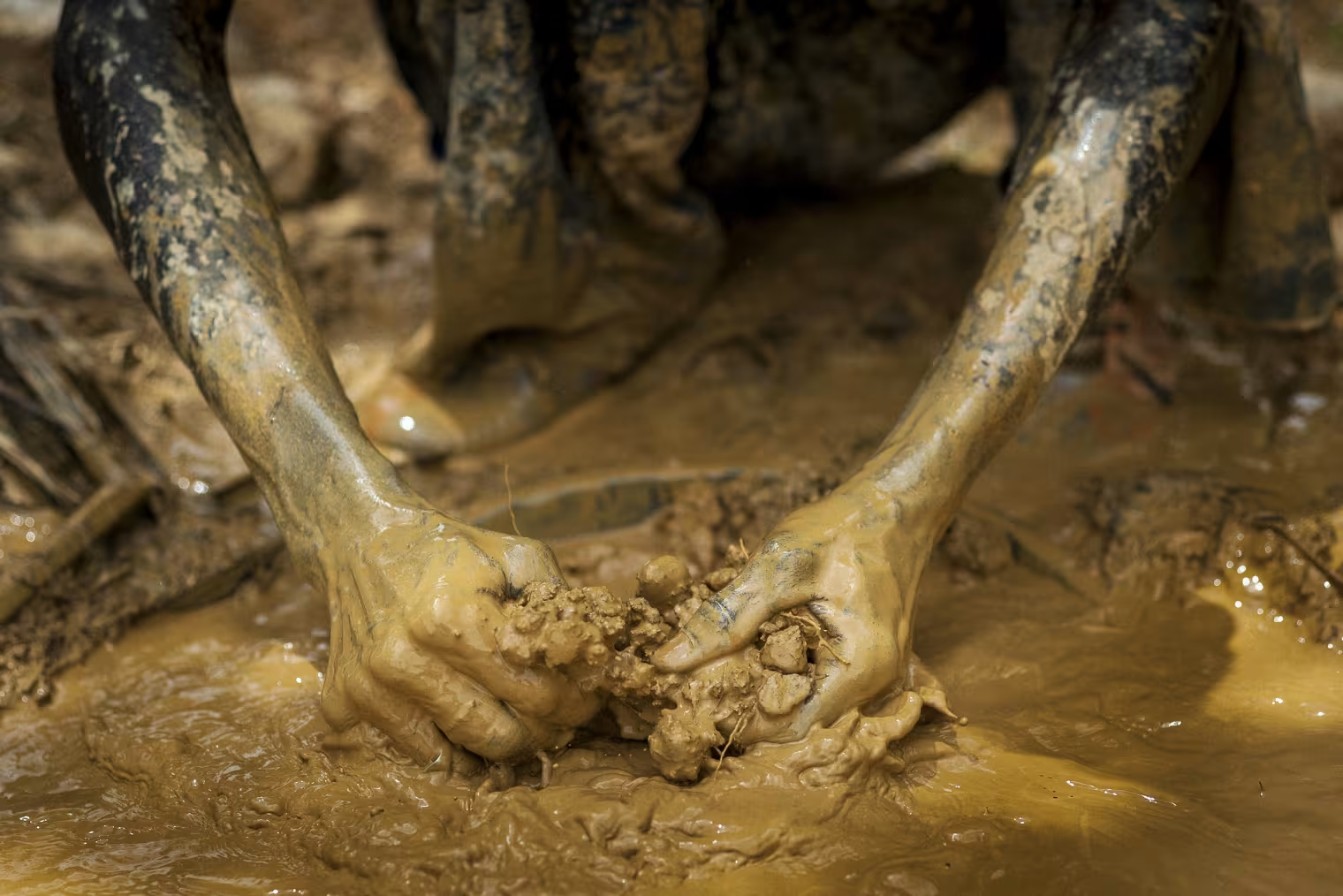Mercury and other heavy metals in the country have contaminated over 60% of the West African country’s water sources, according to Ghana’s Water Resources Commission.
Illegal small-scale gold mining in Ghana has been linked with the destruction of the environment and illness. But for some, the practice known locally as galamsey provides livelihoods and an informal boost to the West African nation’s economy.
With a general election approaching in December, galamsey is proving to be a hot-button issue for the nation’s lawmakers — including President Nana Akufo-Addo — in the face of widespread demonstrations across the country calling for a crackdown on the practice.
In the nation’s capital, Accra, earlier this month, hundreds took to the streets for three days of protests, some carrying signs saying, “Greed is killing Ghana,” and, “Gold for the few, destruction for the many.”
Many carried bottles containing murky, brown water, a reference to the polluting of rivers and waterways in the country. Mercury and heavy metals have contaminated over 60% of the country’s water sources, according to Ghana’s Water Resources Commission.
“If you can drink it, you will stop this protest,” one of the protesters says in a video posted on social media by the activist group #StopGalamsey.
In just the first half of this year, 36% of the gold produced in Ghana came from legal small-scale mines, with a value of around $1.7 billion, according to Ghana’s Ministry of Land and Resources.
But the real total might be much greater, and some estimates suggest that less than 30% of small-scale mines are formally registered with the government, meaning the gold they mine goes under the radar.
Widespread destruction
Legal commercial mines, many of which are operated by multinational firms, often have heavy machinery to dig deep in one concentrated area. But for galamsey, due to its low-budget nature, illegal miners will dig shallow holes across a greater surface area, often near bodies of water. When these holes are not filled back in, the quality of previously arable land diminishes.
The miners will also mix harmful substances like mercury with water to extract the gold they find. This water then leeches into the water supply, tainting sources of water for entire communities.
In August, Ghana Water Ltd., the country’s main water supplier, said it would not be able to provide water to residents of the city Cape Coast and its major surrounding areas because galamsey miners had polluted the nearby Pra River to such a degree that its water could not be treated properly.
Other major rivers like the Ankobra, Oti, Offin and Birim have also been contaminated, sparking public outrage and criticism on social media, while the use of heavy equipment like bulldozers has destroyed forests and affected farmland, according to a report last month by the International Institute for Strategic Studies, a London-based think tank.
After Akufo-Addo took power in 2017, the report said, “the state has pursued high-cost interventions such as deploying soldiers in various missions to arrest illegal miners.” It added that in “some instances, mining equipment like excavators were seized and burned.”
But the threat of high sentences and hefty fines has done little to stop illegal miners from destroying thousands of acres of cocoa plantations and virgin forest, according to data from the online monitoring platform Global Forest Watch.
Yaw Amoafo, who owns several small gold mines employing 20 to 30 people each, said public anger at galamsey mining has forced him to cease operations. He added that he feared the government would introduce a short-term ban on small-scale mining, like the one it implemented in 2017.
While he needed water for his business, he said, “at the same time I need it to drink it or bathe with it. So why should I go and spoil it before using it?”
“After doing everything, you have to reclaim the land so that the land will be available for plantation,” he said, before acknowledging that most Ghanaians did not associate mining with land restoration.
While Ghana’s Minerals Commission does not give licenses to mining operations near waterways, Amoafo said that “most of the rivers in Ghana carry gold,” so the likelihood of finding the precious metal was higher near and in the country’s water sources.
Economic benefit
With gold prices rising by almost 40% over the past year, Ghana, as Africa’s top gold producer and the sixth largest in the world, should be in a position to capitalize.
But commercial gold refineries are lying idle in the country, which suffered a severe economic crisis in 2022 that required a $3 billion bailout from the International Monetary Fund.
“Most of the customers do not even opt to refine in Ghana, because when you refine here, you do not have the hallmark to authenticate it,” said Eddie James Richmond, a metallurgist for the Sahara Royal Gold Refinery, which is based in Accra.
That hallmark comes from the London Bullion Market Association, a U.K.-based trade association that has become the global standard for gold and silver refineries around the world.
The LBMA maintains a “good delivery list” of about 65 gold refineries worldwide that have been proven to source gold legally. Its certification allows gold bars to be sold directly to any precious metals exchange or financial institution worldwide, but only one refinery in South Africa is accredited to issue it.
Making that list can be an arduous task and can take between three and five years, during which time a refinery must refine 10 tons of legally sourced gold at a 99.9% purity level a year.
“They need to know where every gram of gold that they’re refining comes from,” said Neil Harby, the LBMA’s chief technical officer.
Around 20% of the gold produced around the world comes from small-scale miners, but less than 0.05% of it goes through an LBMA-accredited refinery, Harby said.
As a result, a large amount of this gold goes undeclared and billions of dollars’ worth of the precious metal is smuggled out of Africa each year, according to a 2022 report by Swissaid, a nongovernmental organization based in Switzerland that supports projects in the developing world.
“Twelve African countries are involved in smuggling more than 20 tons of gold a year. Most gold smuggling in Africa takes place in Mali, Ghana and Zimbabwe,” it said.
As a result, the State Department warned in an advisory last year, “the use of gold as currency, the cash-intensive nature of elements of the gold trade, and gold’s portability and lack of traceability — particularly from mining to refining — makes it an attractive vehicle by which criminal organizations, armed groups, terrorist organizations, and others seek to move illicit gains, purchase weapons, evade sanctions.”
Ghana is nonetheless looking to get more control over its top commodity. Earlier this year it opened the government-backed Royal Ghana Gold Refinery, with the intent of getting it accredited by the LBMA.
Harby said this could help the country to build its reserves. “You can be turning your small-scale mined gold into good delivery bars, which are stored in your central bank.”
The standards make sure “your Ghanaian refinery is as good as your South African refinery is as good as your North American refinery,” he added. “You all meet that global standard because you’re equal.”








